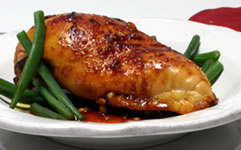Several new products, including margarine, cereal, juice and snack bars, are drawing attention as possible weapons in the battle to lower blood cholesterol. Millions of people are now considered to have high cholesterol, but many consumers are unsure how these products should be used, and by whom.
The most recent government guidelines for treating high blood cholesterol specifically recommend using foods that contain plant stanols or sterols, which have a chemical structure similar to cholesterol. These compounds block absorption of cholesterol from the intestinal tract.
More than 100 studies demonstrate that both total and LDL ("bad") cholesterol levels can be reduced with regular use of stanols or sterols. They occur naturally in vegetables, fruits, nuts, seeds, beans and vegetable oils. Two or three daily servings of foods fortified with extra stanols or sterols generally lower LDL cholesterol about 10 percent.
Who should use the new products containing stanols and sterols? Although it wouldn't hurt others to use them, they were designed for people with high blood cholesterol. High levels of triglycerides, another blood lipid, are not reduced by these products.
Current stanol- and sterol-containing products generally cost several times as much as "regular" versions, so people with high cholesterol may want to first gauge the results of simply reducing their consumption of saturated fat (from fatty meats and dairy products) and trans fats (from deep fried food or commercial bakery and snack foods). If balanced eating is not enough to normalize cholesterol levels, the extra cost of the sterol/stanol products would certainly be less than the cost of cholesterol-lowering drugs, and potential side effects could be avoided as well.
Government guidelines recommend a high-fiber diet to help lower our levels of cholesterol. Soluble fiber, found in oats, beans and some fruits, is the most important type for lowering cholesterol. A National Institutes of Health report in the American Journal of Clinical Nutrition notes that the DASH diet � a low-fat diet that emphasizes an abundance of fruits, vegetables and whole grains � can lower LDL blood cholesterol about nine percent. Such a low-fat, plant-based diet with plenty of fruits and vegetables is exactly the eating approach recommended for lowering blood pressure, and by experts like the American Institute for Cancer Research, to help lower the risk of cancer.
If you choose the margarine types of stanol/sterol products, use them as a replacement for other spreads. Finnish research published in the European Journal of Clinical Nutrition shows that stanol- and sterol-enriched margarines lower cholesterol equally. The stanol product, which tends to be more expensive, can be used in cooking. The sterol ester product, generally less expensive and lower in fat, is for table use only.
If you prefer using limited amounts of olive and canola oils as your primary fat, other stanol/sterol products may be better choices, although each has its downside. The cereal version is not as high in fiber as others. The "juice beverage" option is not the nutritionally preferred 100 percent juice.
As a substitute for less healthy foods, however, these options can help reach the necessary three sources of stanols or sterols a day. Foods with sterol and stanol esters may not be the best first step to lower cholesterol, but they are safe and practical ways to do so while following a balanced diet that protects overall health and lowers your cancer risk.
0
AICR




